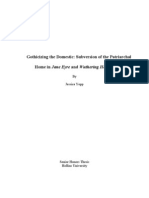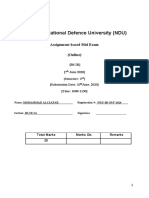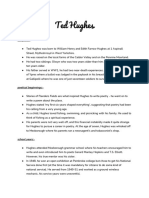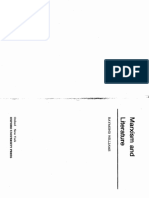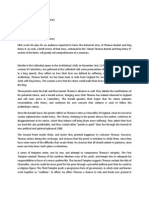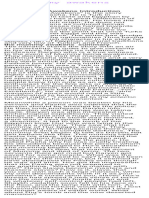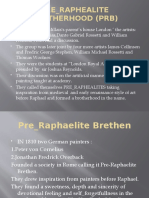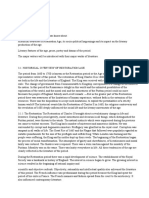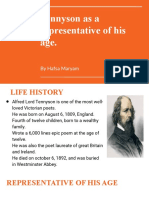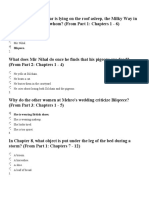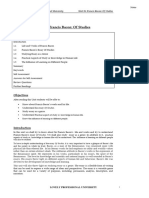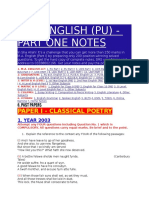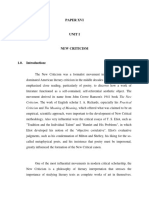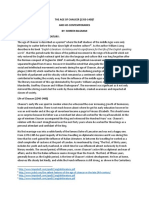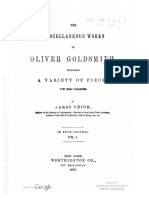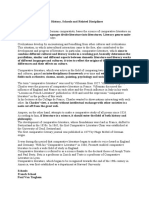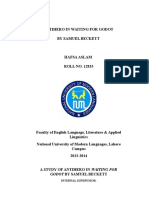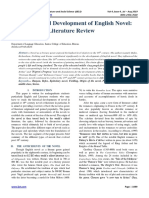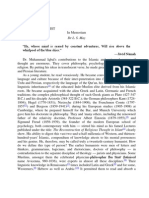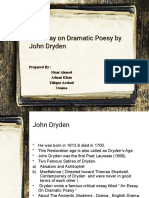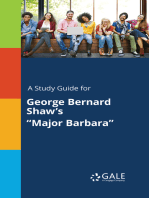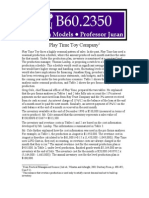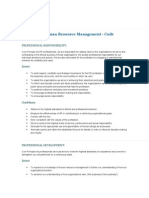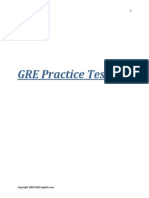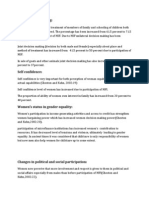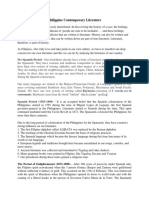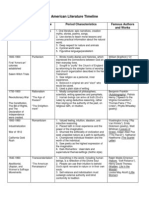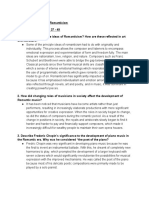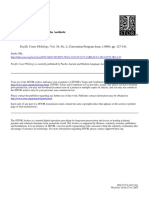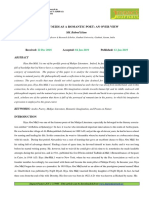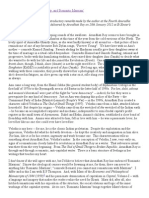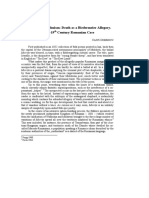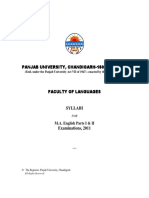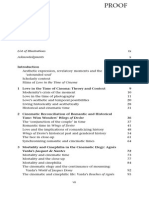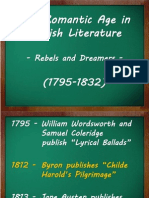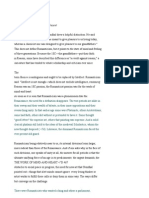English Assignment
English Assignment
Uploaded by
Haseeb MalikCopyright:
Available Formats
English Assignment
English Assignment
Uploaded by
Haseeb MalikOriginal Description:
Copyright
Available Formats
Share this document
Did you find this document useful?
Is this content inappropriate?
Copyright:
Available Formats
English Assignment
English Assignment
Uploaded by
Haseeb MalikCopyright:
Available Formats
History of the English Novel
Definition
The novel is one form of extended fictional prose. It is different from other extended forms of prose such as the allegory ( which functions to teach some moral lesson) and romance (which emphasizes exciting and spectacular events designed to entertain readers). Novels on the other hand focus on character development and arise from the desire to depict and interpret human character. The reader of a novel is both entertained and aided in a deeper perception of life's problems. The roots of the novel come from a number of sources: Elizabethan prose fiction French heroic romance--vast exaggerated narratives about characters who always acted nobly and spoke high-flown sentiment Spanish tales which consisted of episodic adventures held together by the personality of the central figure The word "novel" (which wasn't even used until the end of the 18th century) is an English transliteration of the Italian word "novella"--used to describe a short, compact, broadly realistic tale popular during the medieval period. The novel deals with a human character in a social situation, man as a social being and places more emphasis on character, especially one well-rounded character, than on plot. Another initial major characteristic of the novel is realism--a full and authentic report of human life. The traditional novel has: a unified and believable plot structure sharply individualized and believable characters a pervasive illusion of reality
How Did the Novel in English Come to Be?
There was a public demand for the novel. With the expansion of the middle class by the middle of the 18th century, more people could read and they had money to spend on literature. The early English novel departed from the allegory and the romance with its vigorous attempt at verisimilitude and it was initially strongly associated with the middle class, their practicality, and their morality. There was already a high interest in autobiography, biography, journals, diaries, memoirs. Alexander Pope's saying that "The proper study of mankind is man" led to increased interest in the human character. Novels in the 18th century tended to be considered light reading for young ladies. Initially their focus was on morality and they attempted to provide examples of proper conduct. Later, the 18th century novels developed into loosely structured and semi comical works of fiction. Authors such as William Dafoe established a middle class point of view and a convincing narrative often with first person point of view. Jane Austen was also a contributor to the development of the novel. She wrote highly polished works about social issues such as marriage and money seen from a womans point of view.
Victorian Novel
The novel became the leading form of literature in English in the Victorian era ( 1837 1901). Most writers focused on writing about themes which interested the general public. Some of these novels gave sensationalized accounts of the lives of the working class in an attempt to push for action towards legal and moral change. The novelists of the Victorian era believed that human nature is fundamentally good and lapses are errors of judgment corrected by maturation. They attempted to portray characters that were well rounded and had both good and bad qualities. A major part of the appeal of novels of this time was that they portrayed everyday life that most of their readers experienced. Most of the novels written during this period were long and used complicated language. Charles Dickens was the most well known writer of this period. He wrote extensively about the life of the poor in England. His writing style was easy to understand and he often used sarcasm in his writings.
The romantic novel was another important writing style in this age. Romanticism encouraged a return to nature and also valued the imagination over reason and emotions over intellect. Most novels of the Victorian period were published in serial form; that is, individual chapters or sections appearing in subsequent journal issues. As such, demand was high for each new appearance of the novel to introduce some new element, whether it be a plot twist or a new character, so as to maintain the reader's interest. During this time, authors were paid by the word, which tended to create wordy prose. In part for these reasons, novels are made up of a variety of plots and a large number of characters, appearing and reappearing as events dictate.
20th Century Novel
It is very difficult to get perspective on the literature of our own time because historians usually classify and give labels to it long after the era is over. The 20th century novel is divided into two time periods separated by World War II. These are Modern literature--roughly 1900 or 1914--1945 Contemporary literature--1945 to the present
Many important events took place in this century and had a deep effect on the writers of this time. These events included, among others, the two World Wars, the Cold War and the end of colonialism and communism. There were also many great thinkers of this time who influenced the 20th century novel. Some of these were psychologists like Freud and Jung, others were philosophers or sociologists such as Karl Marx. The great upheavals in societies due to increasing belief in the power of science and the effect of wars led people of this time to develop a way of thinking that was more realistic and less believing of the existence of God. The literature of the Modern period ( before World War II) was subjective, personal and internal. Authors were mainly concerned with portraying the internal thoughts, feelings and emotional struggles of their characters.
Contemporary Literature (1945 Present) The literature of this time period is often referred to as post modern or neo modern literature. The time period that immediately followed World War II was dominated by an awareness regarding the threat of nuclear weapons and the Holocaust. There was a strong resurgence of realistic writing aimed at bringing change. More and more contemporary novels now features the anti-hero, alternately a victim, a rebel, or a bumbling failure. Contemporary authors reflect pluralism. They are preoccupied with perception, and the loss of belief in anything outside the self. Another trend in contemporary novels is the rise of serious fantasy. Writers create worlds where magic exists in real life or they create alternate worlds with fantasy creatures and different realities.
You might also like
- Adh QuotesDocument2 pagesAdh QuoteshappytingsNo ratings yet
- Gothicizing The Domestic - Subversion of The Patriarchal Home in Jane Eyre and Wuthering HeightsDocument52 pagesGothicizing The Domestic - Subversion of The Patriarchal Home in Jane Eyre and Wuthering Heightsjyopp2643100% (3)
- The Second Sex (Women As The Other)Document2 pagesThe Second Sex (Women As The Other)Forhad RaselNo ratings yet
- The Realistic Novel in The Victorian EraDocument4 pagesThe Realistic Novel in The Victorian EraMuhammad Khuram BhattiNo ratings yet
- The Second Sex Summary - GradeSaverDocument3 pagesThe Second Sex Summary - GradeSaverRiaz AhmedNo ratings yet
- Assignment Based Mid Term Exam PaperDocument10 pagesAssignment Based Mid Term Exam PaperAli ZafarNo ratings yet
- 20th Century Novel - Notes-2-1Document33 pages20th Century Novel - Notes-2-1Simo MijmijNo ratings yet
- Ted Hughes: Early LifeDocument3 pagesTed Hughes: Early LifeSaraNo ratings yet
- Modernism in Literature: Taha YasinDocument20 pagesModernism in Literature: Taha Yasinjasmeet gill100% (1)
- Use of Symbolism in Poems of W.B. YeatsDocument4 pagesUse of Symbolism in Poems of W.B. YeatsShirin KamalNo ratings yet
- New HistoricismDocument31 pagesNew HistoricismEbrar BaşyiğitNo ratings yet
- Past Papers 2013 Punjab University MA Part 2 EnglishDocument4 pagesPast Papers 2013 Punjab University MA Part 2 EnglishNoor UlainNo ratings yet
- Raymond Williams Cultural Theory 1Document37 pagesRaymond Williams Cultural Theory 1Karen DuenasNo ratings yet
- Murder in The Cathedral SummaryDocument3 pagesMurder in The Cathedral SummaryDevrupa KundaNo ratings yet
- Renaissance Criticism ExplanationDocument4 pagesRenaissance Criticism ExplanationCiara Janine MeregildoNo ratings yet
- LL306 Hybridity Ambivalence and MimicryDocument12 pagesLL306 Hybridity Ambivalence and MimicryZahra Mohammadi100% (1)
- Sem IV - Critical Theories - General TopicsDocument24 pagesSem IV - Critical Theories - General TopicsHarshraj Salvitthal100% (1)
- The Mummy AwakensDocument1 pageThe Mummy Awakensroshanprinceprince85100% (1)
- Modernism: "The Avantgarde" (Noun) : The Work of Painters, Writers, Musicians and Other ArtistsDocument4 pagesModernism: "The Avantgarde" (Noun) : The Work of Painters, Writers, Musicians and Other Artistsrok modNo ratings yet
- The Contribution of The New CriticsDocument3 pagesThe Contribution of The New Criticssaadi mziri100% (1)
- Sem-5.Crossing The River ThemesDocument2 pagesSem-5.Crossing The River ThemesdushyantNo ratings yet
- English Literature - Preface To Lyrical Ballads - WordsworthDocument9 pagesEnglish Literature - Preface To Lyrical Ballads - WordsworthShubhaiyu Chakraborty100% (1)
- Age of ChaucerDocument4 pagesAge of ChaucerBaloch KarawanNo ratings yet
- Postcolonial Writings: University of CalicutDocument150 pagesPostcolonial Writings: University of CalicutManu JamesNo ratings yet
- Pre - Raphlealite MovementDocument20 pagesPre - Raphlealite MovementFahadkhan KhanNo ratings yet
- Literature Literature: MyselfDocument18 pagesLiterature Literature: MyselfMonjur Morshed Saikat0% (1)
- NovelDocument19 pagesNovelAnirudh P ReddyNo ratings yet
- The Gothic Novel: Novelists of The Romantic AgeDocument2 pagesThe Gothic Novel: Novelists of The Romantic AgeIntezar LahasilNo ratings yet
- Pakistani LiteratureDocument11 pagesPakistani LiteratureFatima ShahidNo ratings yet
- The Restoration AgeDocument7 pagesThe Restoration Ageanime30181g100% (1)
- Tennyson As A Representative of His AgeDocument9 pagesTennyson As A Representative of His Agehafsa100% (1)
- Seamus EaneyDocument21 pagesSeamus EaneyJayaprakash ParamaguruNo ratings yet
- TwilightDocument7 pagesTwilightAR Malik0% (2)
- Sir Francis BaconDocument48 pagesSir Francis Baconmaanye.lgsNo ratings yet
- Modernism: The New Critical IdiomDocument16 pagesModernism: The New Critical IdiomGingerAleNo ratings yet
- Cheif Characteristics of Dryden As Critic PresentationDocument30 pagesCheif Characteristics of Dryden As Critic PresentationQamar KhokharNo ratings yet
- Glossary of Literary TermsDocument6 pagesGlossary of Literary Termsaakritib_4100% (1)
- Past PapersDocument39 pagesPast PapersMuhammad Ijaz Janjua50% (2)
- New CriticismDocument176 pagesNew CriticismAmir Ul HasanNo ratings yet
- American Literature-Richard Wilbur & Adrienne Rich 2015Document31 pagesAmerican Literature-Richard Wilbur & Adrienne Rich 2015ZaraKhan100% (1)
- Ahmed Ali A WriterDocument7 pagesAhmed Ali A WriterjiaNo ratings yet
- THE AGE OF CHAUCER (1350-1400) and His Contemporaries By: Shireen Bilgrami Background of The 14 CenturyDocument3 pagesTHE AGE OF CHAUCER (1350-1400) and His Contemporaries By: Shireen Bilgrami Background of The 14 Centurybushra mumtazNo ratings yet
- Oliver Goldsmith On National PrejudicesDocument10 pagesOliver Goldsmith On National Prejudicesdjpost100% (3)
- Twentieth Century DramaDocument4 pagesTwentieth Century DramaArchana MehraNo ratings yet
- 09 - Chapter 3 PDFDocument40 pages09 - Chapter 3 PDFKanniyammalNo ratings yet
- Comparative LiteratureDocument7 pagesComparative LiteratureMehmet sarı100% (1)
- NUML Best Thesis of Hafsa Aslam Roll No.12835 (MA Eng. 4th Mor)Document68 pagesNUML Best Thesis of Hafsa Aslam Roll No.12835 (MA Eng. 4th Mor)Numl lahoreNo ratings yet
- The Origin and Development of English Novel: A Descriptive Literature ReviewDocument6 pagesThe Origin and Development of English Novel: A Descriptive Literature ReviewIJELS Research JournalNo ratings yet
- Group 1 (Hedda Gabbler)Document14 pagesGroup 1 (Hedda Gabbler)Arslan ChNo ratings yet
- Irfan Khan 2419 AssignmentDocument2 pagesIrfan Khan 2419 AssignmentIrfan BalochNo ratings yet
- IqbalDocument20 pagesIqbalpak123456789100% (1)
- Classics in DramaDocument44 pagesClassics in DramaKamran business accountNo ratings yet
- An Essay On Dramatic PoesyDocument13 pagesAn Essay On Dramatic PoesyNisar AhmedNo ratings yet
- Practical CriticismDocument2 pagesPractical CriticismrameenNo ratings yet
- JAZZDocument10 pagesJAZZKai MalikNo ratings yet
- Matthew Arnold's Views About CriticDocument4 pagesMatthew Arnold's Views About Criticxoxo hafsaNo ratings yet
- The Indian Emperor: "Boldness is a mask for fear, however great."From EverandThe Indian Emperor: "Boldness is a mask for fear, however great."No ratings yet
- 06 PlaytimeDocument5 pages06 PlaytimeHaseeb MalikNo ratings yet
- What Is Tata Motors' Corporate Level Strategy? AnswerDocument1 pageWhat Is Tata Motors' Corporate Level Strategy? AnswerHaseeb MalikNo ratings yet
- Supplier: Bargaining Power of The SuppliersDocument9 pagesSupplier: Bargaining Power of The SuppliersHaseeb MalikNo ratings yet
- Codes of EthicsDocument8 pagesCodes of EthicsHaseeb MalikNo ratings yet
- Compiled Midterm Study GuideDocument9 pagesCompiled Midterm Study GuideHaseeb MalikNo ratings yet
- Resource Limited Project Management: Vladimir Liberzon Spider@Document79 pagesResource Limited Project Management: Vladimir Liberzon Spider@Haseeb MalikNo ratings yet
- Hypothesis Test: Mean vs. Hypothesized ValueDocument6 pagesHypothesis Test: Mean vs. Hypothesized ValueHaseeb MalikNo ratings yet
- GRE Practice TestDocument78 pagesGRE Practice TestHaseeb MalikNo ratings yet
- A Passage To IndiaDocument14 pagesA Passage To IndiaAlisha RoyNo ratings yet
- GRE Practice TestDocument78 pagesGRE Practice TestHaseeb MalikNo ratings yet
- Adnan BRM 1stDocument2 pagesAdnan BRM 1stHaseeb MalikNo ratings yet
- English Romantic Poetry UnitDocument23 pagesEnglish Romantic Poetry UnitJournaling GailNo ratings yet
- Artistic Collaboration in The Twentieth CenturyDocument25 pagesArtistic Collaboration in The Twentieth CenturyAlexandre PajeúNo ratings yet
- Puritan PeriodDocument4 pagesPuritan PeriodZahid Hasan100% (1)
- Philippine Contemporary LiteratureDocument11 pagesPhilippine Contemporary LiteratureGeorey Esguera Paglinawan100% (3)
- Eoct American Lit Timeline Study GuideDocument2 pagesEoct American Lit Timeline Study Guideapi-236554098No ratings yet
- Music Appreciation - Exam 4Document2 pagesMusic Appreciation - Exam 4Jasper MpofuNo ratings yet
- B.A. (Hons.) III Year English Lord Byron1Document42 pagesB.A. (Hons.) III Year English Lord Byron1StB31No ratings yet
- Mellor - Romanticism, Difference and AestheticsDocument16 pagesMellor - Romanticism, Difference and AestheticsMahmoud HassaniNo ratings yet
- Alain de Bototn - Pygmalion and Your Love LifeDocument10 pagesAlain de Bototn - Pygmalion and Your Love LifeFabián BarbaNo ratings yet
- Iliya Abu MaDi As A Romantic Poet An Over View-2019-01!12!07-18Document10 pagesIliya Abu MaDi As A Romantic Poet An Over View-2019-01!12!07-18Impact Journals100% (1)
- Wordsworth's Preface To Lyrical BalladsDocument4 pagesWordsworth's Preface To Lyrical BalladsDhiman Nath100% (4)
- 18th Century TimelineDocument10 pages18th Century TimelineValerie Dominguez-GarciaNo ratings yet
- Shelley OzimandiasDocument14 pagesShelley OzimandiasAmela Hrasnica100% (1)
- Review of On Psychological and Visionary Art: Notes From C G Jung's Lecture Gérard de Nerval's Aurélia'Document4 pagesReview of On Psychological and Visionary Art: Notes From C G Jung's Lecture Gérard de Nerval's Aurélia'rhapsodysingerNo ratings yet
- Critical Essays Wordsworth's Poetic Theory - Preface"": Bookmark This PageDocument6 pagesCritical Essays Wordsworth's Poetic Theory - Preface"": Bookmark This PageEbrahim Mohammed AlwuraafiNo ratings yet
- Bernard D'Mello, - Arundhati Roy, Anuradha Ghandy, and 'Romantic Marxism'Document4 pagesBernard D'Mello, - Arundhati Roy, Anuradha Ghandy, and 'Romantic Marxism'Kanagu RajaNo ratings yet
- Eng.433 Modern Lit. MovementsDocument90 pagesEng.433 Modern Lit. Movementsiustinsfariac6437100% (1)
- CROMBEZ Murderofart Intro TOC 2017Document5 pagesCROMBEZ Murderofart Intro TOC 2017m:mNo ratings yet
- The Supreme Euphuism: Death As A Biedermeier Allegory. A Mid-19 Century Romanian CaseDocument14 pagesThe Supreme Euphuism: Death As A Biedermeier Allegory. A Mid-19 Century Romanian Caselorena sacalisNo ratings yet
- MA EngDocument43 pagesMA Engsanjay dasNo ratings yet
- What Kind of A Poem Is Matthew ArnoldDocument26 pagesWhat Kind of A Poem Is Matthew ArnoldDilip ModiNo ratings yet
- Love in The Time of Cinema - SampleDocument37 pagesLove in The Time of Cinema - SampleKata KisNo ratings yet
- The Romantic Age in English LiteratureDocument40 pagesThe Romantic Age in English LiteratureJC Chavez100% (3)
- English Tintern AbbeyDocument29 pagesEnglish Tintern AbbeyJagruti Nirav100% (1)
- British Poetry: 3. Analyse The Use of Time and Temporality in Spenser's Epithalamion and ProthalamionDocument17 pagesBritish Poetry: 3. Analyse The Use of Time and Temporality in Spenser's Epithalamion and ProthalamionAnju PNo ratings yet
- Nationalism in B.SDocument18 pagesNationalism in B.SmarwaNo ratings yet
- Lawrence and HamletDocument12 pagesLawrence and HamletSoha SNo ratings yet
- Akutagawa and I-NovelistsDocument16 pagesAkutagawa and I-NovelistsJasmina MojicNo ratings yet
- 1 Barzun RomanticismDocument25 pages1 Barzun RomanticismjoecerfNo ratings yet

